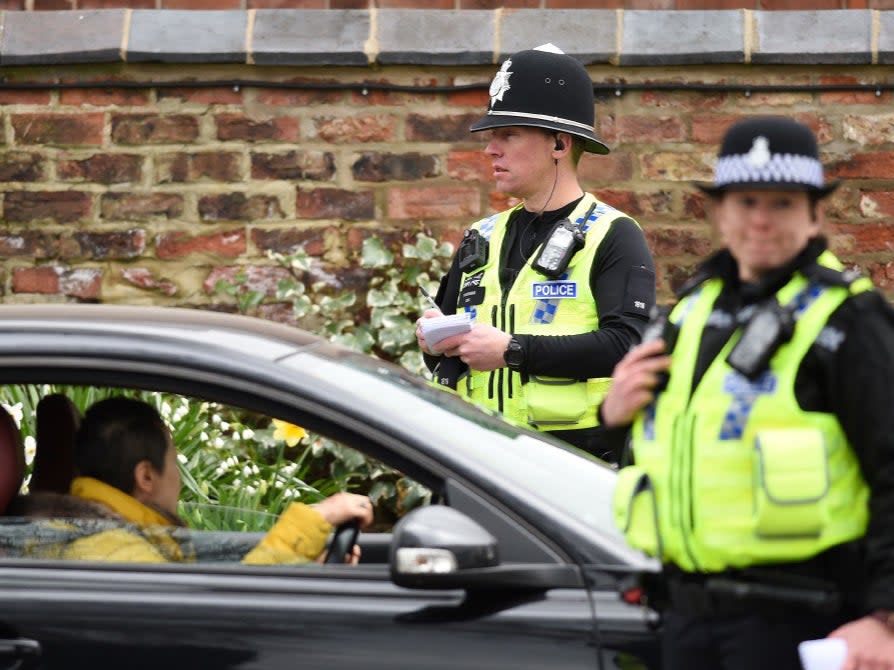Covid: The only reasons you can leave your house in new lockdown

Police officers from North Yorkshire Police stop motorists in cars to check that their travel is “essential”, in line with the British Government’s Covid-19 advice to “Stay at Home”, in York, back in March 2020
(AFP/Getty)England has been plunged into a new national coronavirus lockdown, and the government has brought its message of “Stay home. Protect the NHS. Save lives” back again.
In a televised address, the prime minister ordered people to stay at home and do “everything we possibly can to stop the spread of the disease”.
Boris Johnson outlined the limited number of reasons people will be permitted to leave their homes for, which includes for essentials, to go to work if working from home is not possible, to exercise, to seek medical attention or to escape domestic abuse.
Follow the latest coronavirus news live
“If you are clinically extremely vulnerable, we are advising you to begin shielding again and you will shortly receive a letter about what this means for you,” he added.
According to government guidance, the instruction to stay at home will be enforceable by law, and police can issue Fixed Penalty Notices up to a maximum of £6,400 if someone leaves their home without a “reasonable excuse”.
Here is a breakdown of the only reasons you can leave your home once the new lockdown comes into force at midnight.
Work
You can only leave home for work purposes where it is not possible to work from home.
This includes people who work within critical national infrastructure, construction or manufacturing, which requires in-person attendance.
You can also leave home to provide voluntary or charitable services.
Essential activities
People will be allowed to leave home to buy essential items at shops or obtain services.
You can also leave your home to help a vulnerable or disabled person, or someone who is self-isolating, to shop for essentials on their behalf.
Education and childcare
You can leave home for education, registered childcare and supervised activities for children where they are eligible to attend.
People can also continue with existing arrangements for contact between parents and children if they live apart, as well as with childcare bubbles.
Meeting others and providing care
If you are legally permitted to form a support bubble, you can leave home to visit those in your support bubble and to provide informal childcare for children under 14 as part of a childcare bubble.
You can also provide care for disabled and vulnerable people, provide emergency assistance, and attend a support group of up to 15 people.
Leaving home for respite care will also be permitted where that care is being provided to a vulnerable or disabled person, or as a short break in respect of a looked-after child.
Exercise
Outdoor exercise can continue alone or with one other person, or with your household or support bubble.
However, this should be limited to once per day and the government advises against travelling outside your local area for exercising. It also urges people to maintain social distancing.
Medical reasons
If you need to leave home for a medical reason, including to get a Covid-19 test, for medical appointments and emergencies, you can.
You can also leave home to be with someone who is giving birth, or to visit someone who is dying.
Visiting someone in a care home, hospice or hospital, or to accompany someone to a medical appointment is also permitted.
Animal welfare reasons, such as to visit the vet for advice or treatment, is also considered a “reasonable excuse” to leave home.
Harm
You can leave home to escape risk of harm, such as domestic abuse.
Communal worship and life events
You can leave home to visit a place of worship for communal worship, funerals and weddings as long as you observe social distancing rules and do not mingle with anyone outside your household or support bubble.
Weddings, funerals and other events linked to a death are all subject to limits on the number of people who can attend. Weddings and civil ceremonies can only take place in “exceptional circumstances”.
Read More
What are the rules for home and abroad during national shutdown?
Everything you need to know about shops and takeaways during lockdown

 Yahoo News
Yahoo News 
